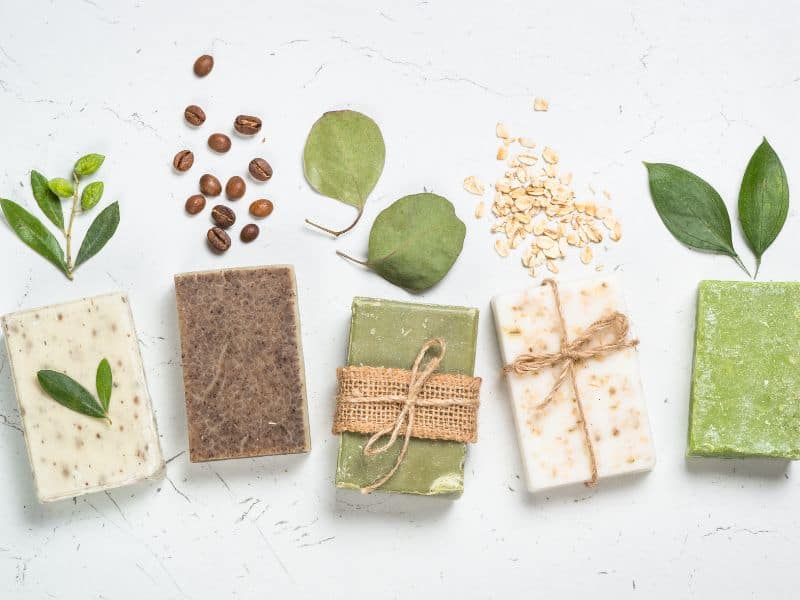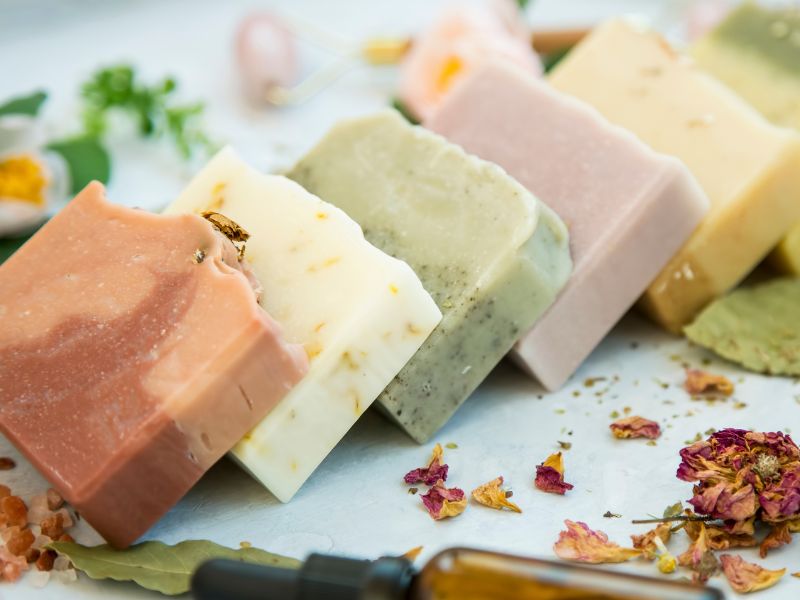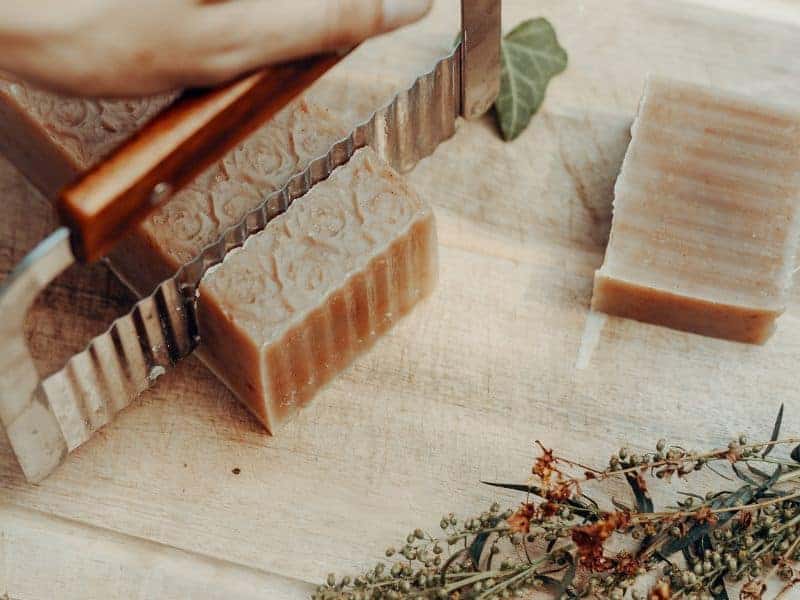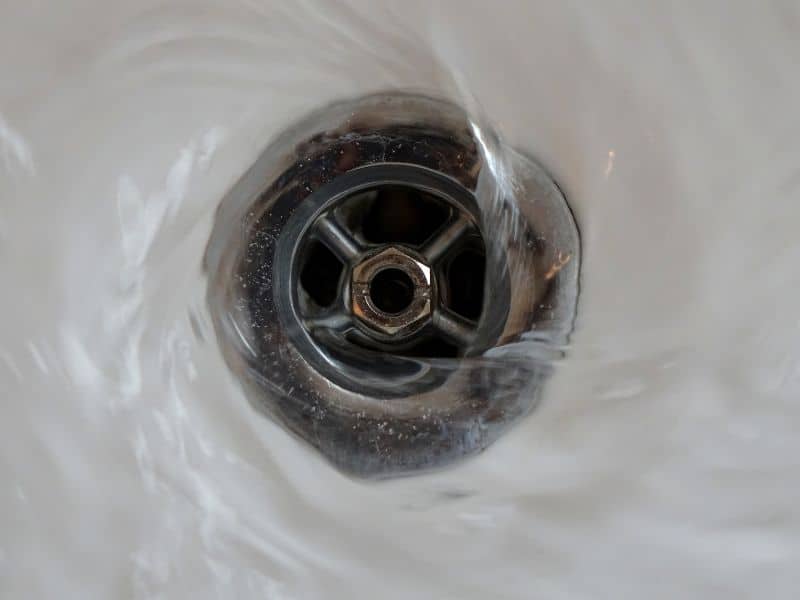Melt and pour soap has become increasingly popular as people look for more sustainable ways of living. It’s easy to use and requires no special equipment or ingredients – just melt the pre-made base, add some colorants or essential oils, and pour it into molds! Let’s explore what makes a product natural and why melt and pour soap may fit that definition better than you think.
Melt and pour soap is considered natural because it is made with natural ingredients such as vegetable oils, glycerin, and essential oils, and is free from synthetic detergents commonly found in commercial soaps.
It can also be vegan, depending on the ingredients. In addition, melt and pour soap can be used without any additional chemicals or preservatives. This means that you are in control of the ingredients that end up in your final product, so you know exactly what’s going into your soap.
What Does “Natural” Mean in Soap Making?
If you’re someone who values using natural products in your daily life, you may be curious about what “natural” means in the context of soap making. Let’s take a closer look.
Define the term “natural” and why it matters to some consumers
The term “natural” in soap making generally refers to ingredients that are derived from plants or animals, rather than synthetic or artificial ingredients. Some common natural soap ingredients include oils, herbs, and essential oils. The goal of using natural ingredients in soap making is to create a product that’s gentle on the skin and free from harsh chemicals that can be found in some commercial soaps.
Explain some common natural soap ingredients, such as oils, herbs, and essential oils
There are many natural ingredients that can be used in soap making, but here are a few common ones:
- Oils: Oils such as olive oil, coconut oil, and avocado oil are commonly used in soap making for their moisturizing and skin-nourishing properties.
- Herbs: Dried herbs like lavender, chamomile, and peppermint can be added to soap for their scent and potential therapeutic benefits.
- Essential oils: These concentrated plant extracts can be used to add natural scents and additional skin benefits to soap. Common essential oils used in soap making include tea tree oil, peppermint oil, and lavender oil.
For some consumers, using natural soap is important for their overall health and wellness routine.
Why Melt and Pour Soap is Natural
Melt and pour soap bases are typically made with natural ingredients such as vegetable oils, glycerin, and essential oils. Vegetable oils like coconut oil, olive oil, and palm oil are commonly used because they are gentle on the skin and provide moisturizing benefits. Glycerin, a natural byproduct of soap making, is often added to melt and pour soap bases for its moisturizing properties.
Natural Additives
Essential oils, such as lavender or peppermint, are also used to add natural scents and potential therapeutic benefits to the soap. Natural colorants such as turmeric or beetroot powder can also be added to melt and pour soap for a pop of color.
Natural vs Synthetic
Melt and pour soap can be made without synthetic detergents, which can be harsh on the skin. Synthetic detergents are often added to commercial soaps to create a lathering effect, but they can strip the skin of its natural oils and cause dryness or irritation.
Melt and pour soap, on the other hand, is made using a gentle process that preserves the natural ingredients and nutrients in the soap. It’s a great choice for those with sensitive skin or anyone looking for a natural alternative to commercial soap.
Natural Melt and Pour Soap Bases
Here is a list of some common natural melt and pour soap bases:
- Goat milk soap base: made with real goat milk, which is high in vitamins and minerals that nourish the skin
- Shea butter soap base: made with shea butter, a moisturizing ingredient that’s rich in vitamins A and E
- Hemp oil soap base: made with hemp oil, which is high in fatty acids and has anti-inflammatory properties
- Aloe vera soap base: made with aloe vera gel, which is known for its soothing and healing properties
- Coconut oil soap base: made with coconut oil, a gentle and nourishing oil that’s great for sensitive skin
- Olive oil soap base: made with olive oil, moisturizing oil that’s high in antioxidants and has anti-inflammatory properties
- Honey soap base: made with real honey, which is antibacterial and can help soothe and heal the skin
Be sure to read the ingredients list carefully before purchasing a melt and pour soap base to ensure that it meets your personal definition of “natural.” Some soap bases may contain additional ingredients or additives that you may want to avoid.
Natural Colorants for Melt and Pour Soap
Using natural colorants is a great way to add color to melt and pour soap while avoiding synthetic ingredients. Natural colorants can come in many forms such as powders, herbs, or clays, and can provide a wide range of colors from earthy browns to vibrant pinks. Natural colorants can also provide added benefits to your soap such as skin-soothing properties or exfoliation.
Some popular natural colorants for melt and pour soap include beetroot powder, which provides a natural pink or red color, and turmeric powder, which provides a warm yellow color. Charcoal powder is also a popular choice for adding a natural black or gray color to soap and can help to absorb impurities from the skin. Spirulina powder is a blue-green algae that can add a natural green color to soap while also providing skin-nourishing benefits.
It’s important to note that when using natural colorants in soap making, the color may vary depending on the amount used and the base used. It’s always a good idea to experiment with small batches to achieve your desired color. Additionally, some natural colorants may be more sensitive to light or heat and may fade over time, so it’s important to store your soap properly to preserve the color.
Overall, using natural colorants in melt and pour soap making is a fun and creative way to add color while staying true to natural ingredients.
Natural Fragrances for Melt and Pour Soap
Natural fragrances can add a pleasant aroma to melt and pour soap without the use of synthetic fragrances that can cause irritation to some people. Natural fragrances can come in many forms, such as essential oils, dried herbs, and spices, and can provide a wide range of scents from floral and fruity to earthy and spicy.
Essential oils are a popular choice for adding natural fragrances to melt and pour soap. Some popular essential oils for soap making include lavender, peppermint, and lemon. Dried herbs and spices can also provide a subtle scent and texture to soap. For example, adding dried lavender buds to soap can provide a natural lavender scent and a gentle exfoliating texture.
It’s important to note that when using natural fragrances in soap making, it’s best to start with a small amount and gradually increase as needed. Some essential oils can be irritating to the skin if used in high concentrations, so it’s important to research and follow proper usage guidelines. Additionally, it’s important to choose high-quality natural fragrances that are free from synthetic ingredients and are safe for use in soap making.
Overall, using natural fragrances in melt and pour soap making is a great way to add a pleasant scent while avoiding synthetic fragrances. With a wide range of natural fragrances to choose from, it’s easy to find a scent that appeals to your senses and provides added benefits to your skin.
Frequently Asked Questions
Natural colorants for melt and pour soap include turmeric powder, activated charcoal, clays, and natural pigments like iron oxide or titanium dioxide.
Natural fragrances for melt and pour soap include essential oils like lavender, tea tree, peppermint, and eucalyptus. You can also use herbs like rosemary, chamomile, and mint leaves for a more subtle scent.
Natural exfoliants for melt and pour soap include oatmeal, walnut shells, coffee grounds, and sugar. Be sure to use a gentle exfoliant as some ingredients, such as walnut shells, can be abrasive on the skin.
It depends on the type of melt and pour soap base you are using. Some manufacturers add preservatives to extend the shelf life of their soap bases.
Conclusion
In conclusion, melt and pour soap can be a great choice for those looking for natural alternatives to commercial soaps. It is made with natural ingredients such as vegetable oils, glycerin, essential oils, and other additives to provide nourishing benefits to the skin. Be sure to read the ingredients list carefully before purchasing a melt and pour soap base to ensure that it meets your personal definition of “natural.” With the right ingredients, you can create a custom bar of soap that suits all your needs!






